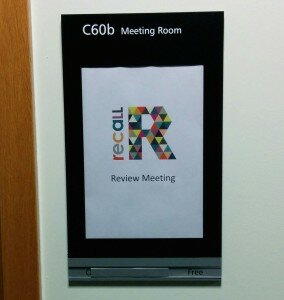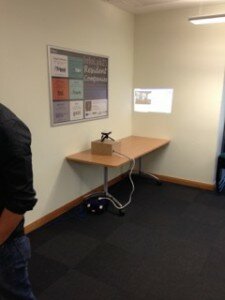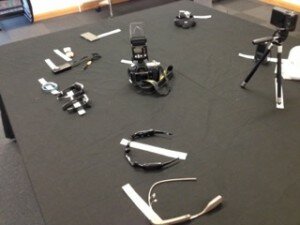
It has been more than a year since the project’s kick off in November 2013. On January 7, 2015, RECALL had it’s first-year project review meeting. The meeting took place at the University of Lancaster, where RECALL researchers from the all four sites gathered together to present our first-year results to the reviewers.
Most of the team members arrived in Lancaster already a day early, to spend all of January 6 preparing the meeting. Meeting preparations included a full dry run of the presentations and demos, as well as poster printing and handouts preparations.
The actual review meeting started early on January 7 with the project coordinator, Prof. Nigel Davies, presenting the agenda, before all participants introduced themselves and their role in RECALL. The review was structured roughly into a morning with presentations, and an afternoon with demonstrators and discussions.

A substantial amount of time was spent on presenting a high-level overview of the project’s first-year progress, including highlights of the work carried out for the work-packages, the software prototypes that were created, and the project’s dissemination and outreach activities. Each work-package leader then presented detailed descriptions of key outputs and methods of RECALL’s five main work packages.
Over a buffet lunch, project members and reviewers discussed key project contributions that were presented on a series of posters around the room (see Figure 2&3).

The afternoon saw a round of demos, specifically showcasing L.I.S.A. (Figure 3), a prototype running on a raspberry pi that is designed to show the possibilities of a future personal assistant that helps people learn from their past and remember future events. Another demo showed how the use photographs on pervasive public displays can foster emotional attachment.
In addition, a “trinket table” showcased all the devices and gadgets that had been used so far in RECALL in the context of different data collection experiments (Figure 4).
After a reviewer-only discussion session, the project received immediate feedback on its progress so far. The reviewers provided an initial set of recommendations (with detailed suggestions to be included in the formal write-up), as well as an overall rating. Ratings in EU projects range from “unsatisfactory” to “acceptable”, “good”, and finally “excellent”. The entire RECALL team was very pleased to receive the highest overall assessment — excellent — from the reviewers for the progress that was made in the first year. Hooray! This is certainly a strong motivation for everybody to continue their hard work on RECALL

!